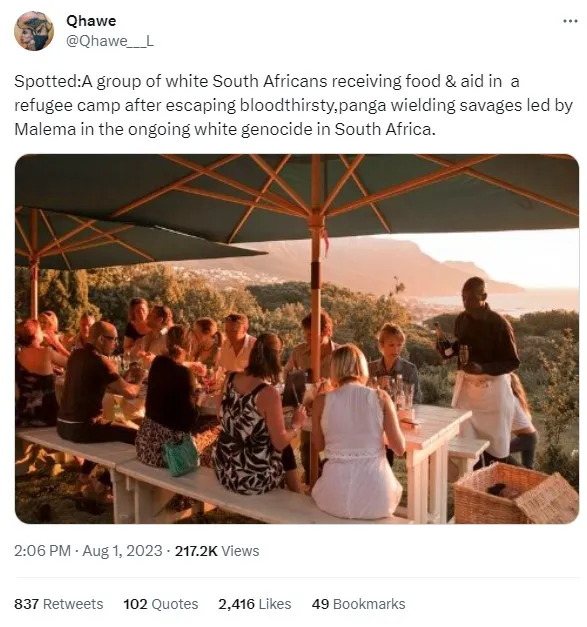Social media conversation in South Africa saw a respite from the daily challenges of particularly black impoverished communities related to poor service delivery, corruption and high crime rates. Instead, the conversation that got fingers tapping was about EFF party leader Julius Malema and the owner of Twitter (now called X), Elon Musk.
Just two months ago, Wired published an article that quoted Musk saying the changes he made at Twitter were a return to free speech. He said it’s “freedom of speech, not freedom of reach”, hence people could tweet whatever they wanted. However, if the content is offensive, it will get downrated.
“So, if you’re a jerk, your reach will drop,” said Musk.
After Malema sang the song “Kill the Boer, Kill the Farmer” at the EFF’s 10-year celebration on 29 July, Musk took to his own platform, making claims about white genocide in South Africa. This aligns with a post-apartheid narrative of “farm murders” and “white genocide”, which scared some white South Africans. A number even left the country for fear of their lives.
In 2012, the ANC pledged to refrain from singing the song because of the disturbing effect it could have on white South Africans. In the same year, Julius Malema was expelled from the party, leading him to create the EFF in 2013.
Holding Musk to account for saying that the reach will drop, the Centre for Analytics and Behavioural Change (CABC) analysed the reach of posts from Elon Musk and Julius Malema made before and during the most recent conversation.
We see that Malema’s singing of the controversial song, in a nation trying to broker trust and stronger social bonds, caused a spike in conversation between 31 July and 2 August, and reached a plateau in the first week in August.

If we isolate the Malema vs Musk discussion on X, we see that Malema gained far more traction than Musk. Malema enjoyed about 20,000 mentions on 1 August, compared with Musk’s 5,000.

Some examples from 1 August, sorted by highest retweets, that reference Julius Malema include the following:
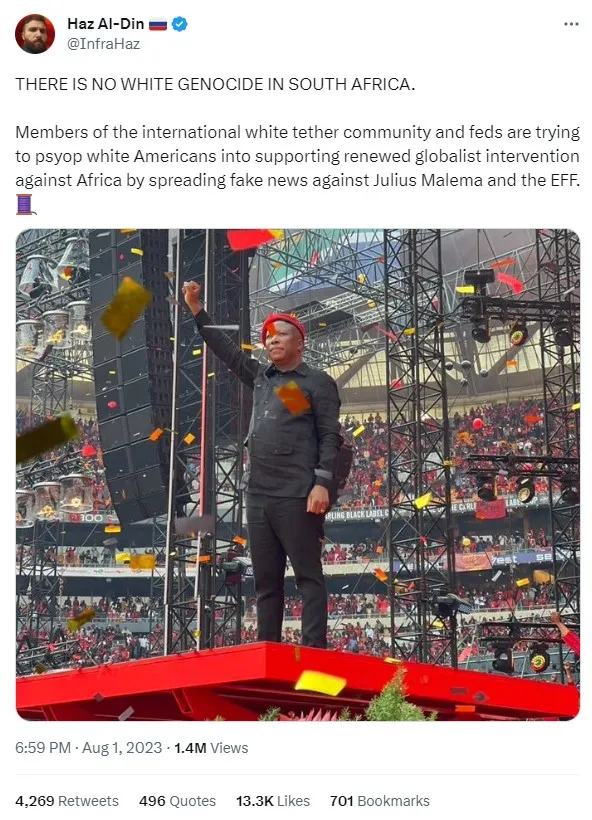
Examples that reference Elon Musk on 1 August, also sorted by highest retweets in the CABC’s dataset, include the following:
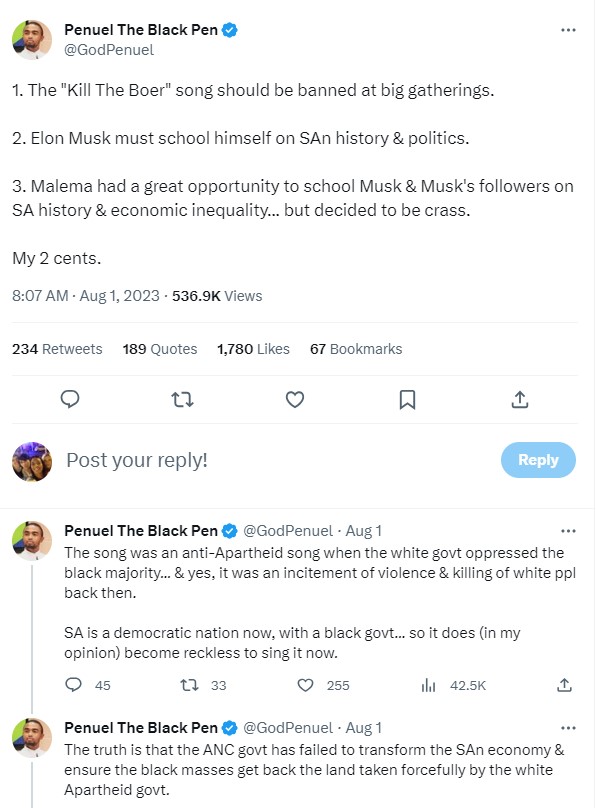
The top tweeting accounts based on the farm murders and genocide narratives were Fox News, The Washington Post and a retweet by the arch-conservative Ben Shapiro. These tweets are shown below:
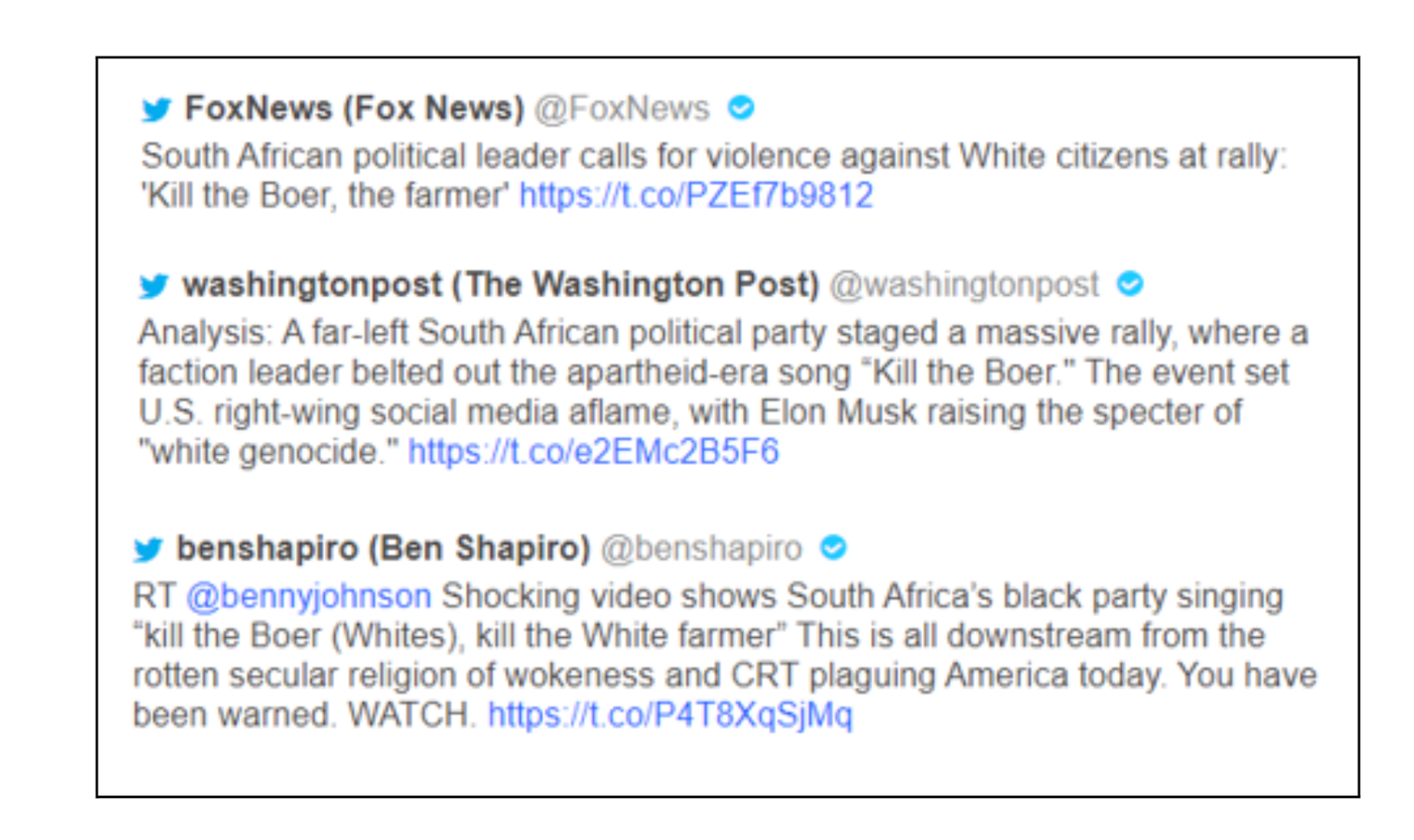
Turning away from references to Musk and Malema, the CABC then analysed the kind of reach they had before and during the spike in conversation.
From 24 to 30 July, the official account of Elon Musk created 268 mentions with a total reach of 1.21 billion users. Then, looking at the second date range, 31 July to 6 August – the week in which the conversation peaked – Musk’s mentions increased to 320 and the total reach of his posts dropped to below 1 billion (985 million users were reached).
So, while Musk tweeted, commented, retweeted or quote-tweeted more content in the week of the conversation spike, it appears that his reach dropped by 19%. This could be because of the “jerk downrating” that problematic content receives.
Comparing Julius Malema over the same period reveals 205 mentions and a total reach of 20.74 million. In the controversial week, Malema only created 86 mentions – 119 mentions less than the week before. However, Malema’s total reach that week jumped to 25.86 million.
A possible reason for the increase in Malema’s reach could be because of the platform or stage that he was given by Elon Musk’s 152 million followers, blowing Malema’s song completely out of proportion and making claims about a white genocide.
Two examples of Musk’s tweets in relation to the narrative of so-called farm murders are shown below.
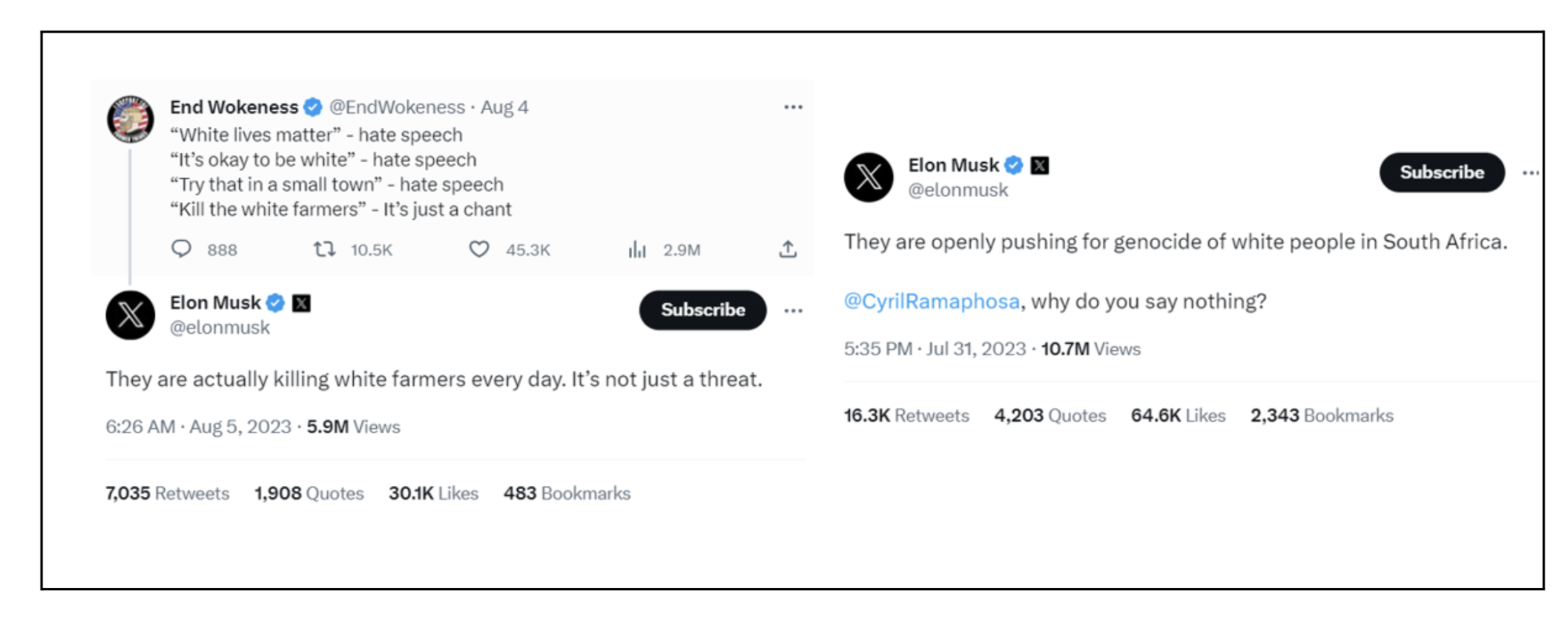
The narrative of a white genocide and farmers being murdered has been driven on social media platforms for a while. The reality, however, is far from the sentiment that Musk has erroneously created.
Johan Burger from the Institute for Security Studies compared the number of farm murders and attacks that were recorded by both police and the Transvaal Agricultural Union (TAU). The report shows the SA Police Service (SAPS) recorded 62 murders on farms in South Africa in 2018 while the TAU reported 33.
Regardless of which number is more accurate, this shows that Musk’s posts about a “white genocide”, and claims that white farmers are killed every day, have no basis and should be considered misinformation. Moreover, subject matter experts confirm that the statistics include black farmers and workers on farms.

Since 2019, AfriForum has used several sources, including the police, private security companies and victims, to report on the number of farm murders across South Africa.
The graph below was compiled using the data in this AfriForum report and shows the number of farm murders recorded nationally between 2019 and 2022.
In 2022, a total of 50 farm murders were reported. This is down from 63 and 55 in 2020 and 2021, respectively.
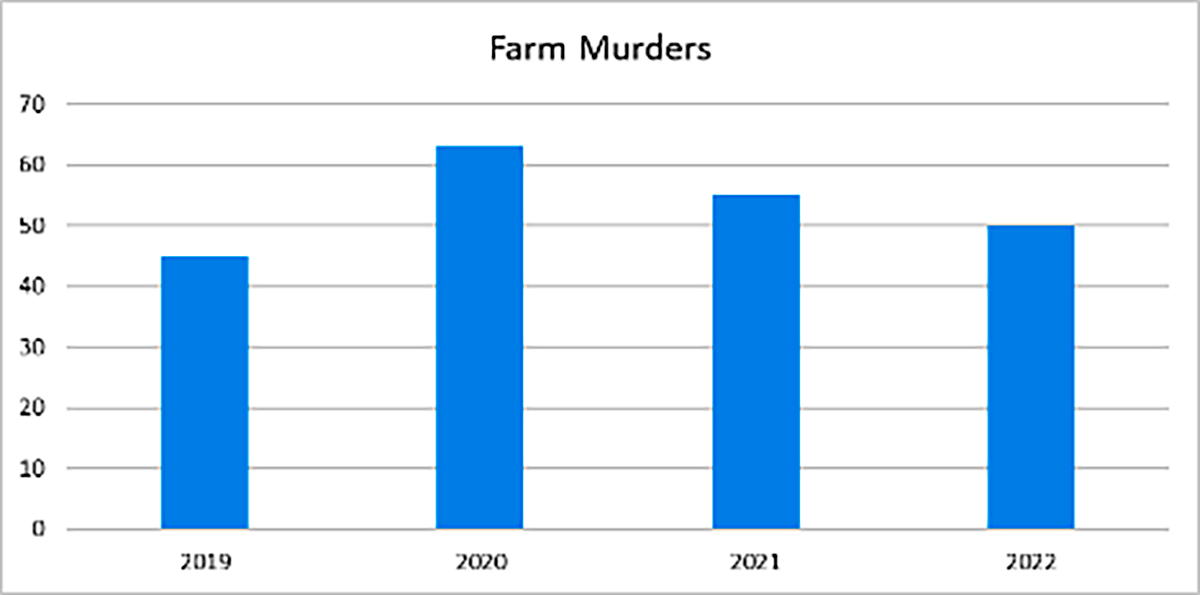
The report goes on to explain that of the 50 farm murders, 38% were of farmers (the race of these farmers is not specified in the report) and 20% were farm workers.
While murder is never condoned, to put the number of 50 total murders into perspective nationally, SAPS annual crime stats for 2021 to 2022 show that a total of 25,181 murders occurred across the country. Combining the 2021 (55) and 2022 (50) numbers from the AfriForum report, farm murders contributed 0.4% – less than half a percent – to all murders committed in South Africa.
Musk has not confirmed the source of his information. By all accounts, it appears that Musk’s tweet must be considered mis- or disinformation.
It remains to be seen if Musk will set the record straight after stoking up negative sentiment based on unsubstantiated claims, and if Malema will be held accountable for hate speech based on the definition of such by the Prevention and Combating of Hate Crimes and Hate Speech Bill. DM
Yossabel Chetty is a Lead Researcher at the Centre for Analytics and Behavioural Change (CABC).




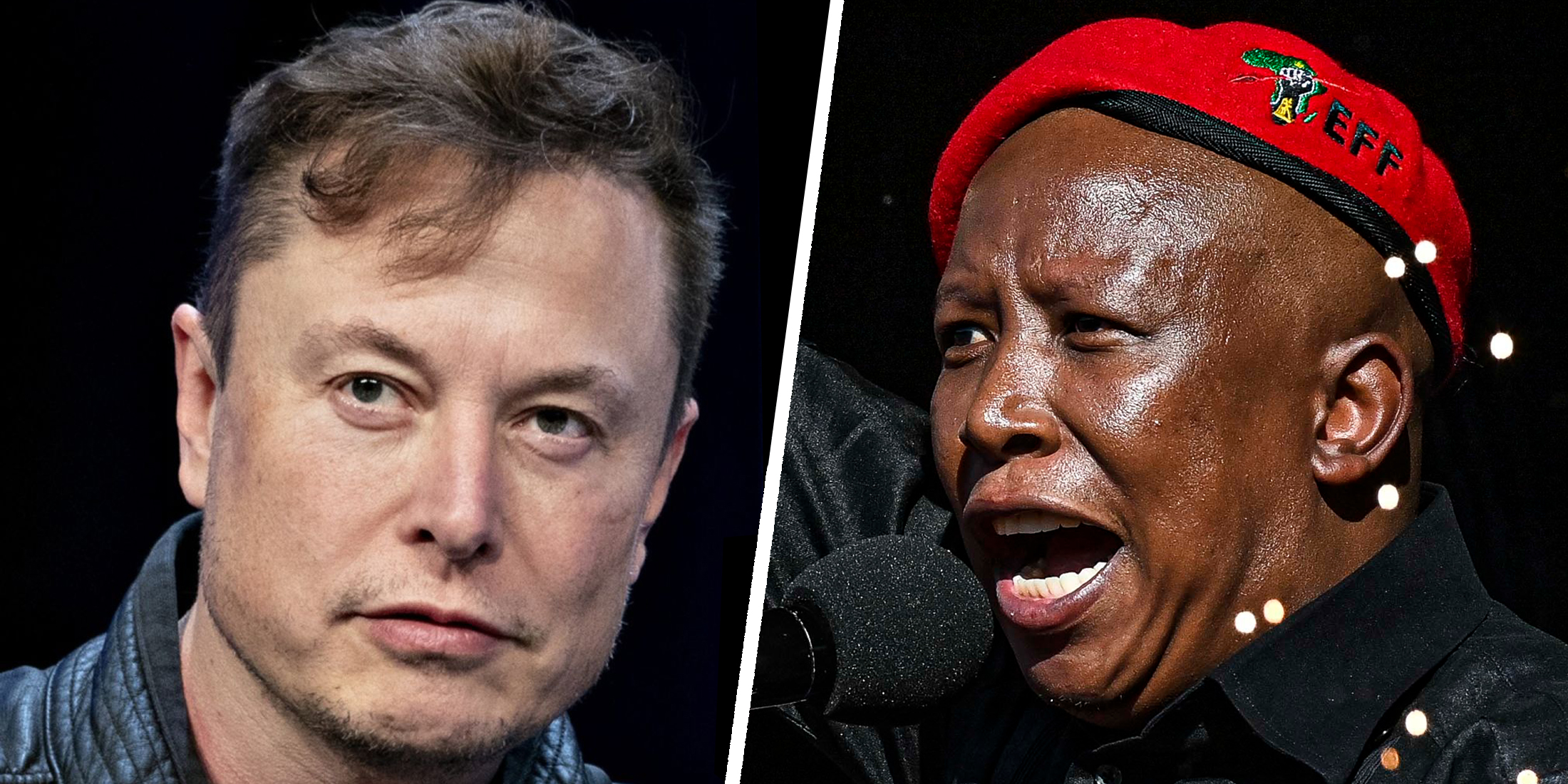 Qhawe: Tweet
Qhawe: Tweet
